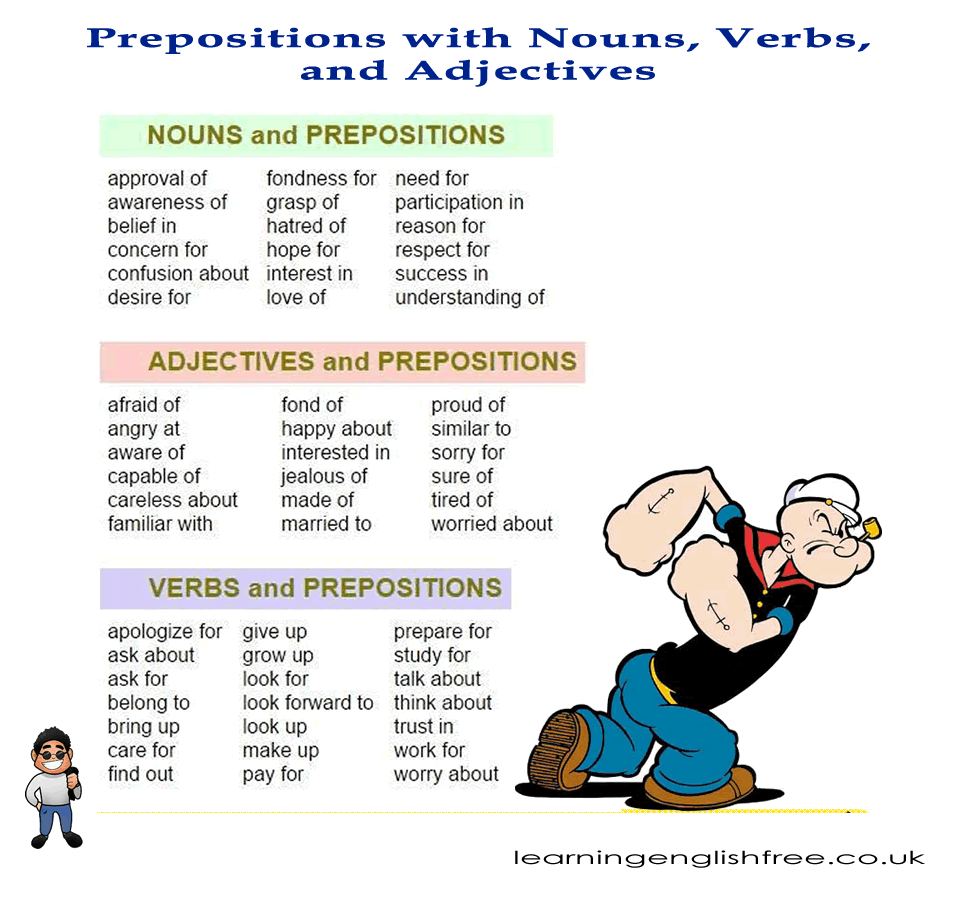The Comprehensive Guide to Prepositions with Nouns, Verbs,
and Adjectives in English

A Step-by-Step Exploration of Prepositions in English Grammar
Understanding Prepositions in Context
The Art of Pairing Prepositions with Nouns, Verbs, and Adjectives
This lesson delves into the intricate world of prepositions in English, focusing on their use with nouns, verbs, and adjectives. You'll learn the rules and how to apply these prepositions in context, which is crucial for effective communication. We'll explore various combinations, providing examples in sentences to enhance understanding. This structured approach will aid in memory retention and application. For those who wish to expand their knowledge further or have any queries, our team is always available at www.facebook.com/learningenglishfree.co.uk.
Detailed Combinations and Examples
Practical Usage of Prepositions in English Grammar
Nouns and Prepositions:
- Approval of: "The committee expressed their approval of the new plan."
- Awareness of: "She has a strong awareness of the current issues."
- Belief in: "His belief in democracy is unwavering."
- Concern for: "She showed great concern for her friend's well-being."
- Confusion about: "There is a lot of confusion about the new laws."
- Desire for: "He has a strong desire for success."
- Fondness for: "She has a fondness for classical music."
- Grasp of: "He has an excellent grasp of the subject."
- Hatred of: "His hatred of injustice drives his actions."
- Hope for: "There's still hope for a resolution."
- Interest in: "Her interest in art is quite evident."
- Love of: "His love of nature is inspiring."
- Need for: "There's a critical need for change."
- Participation in: "Their participation in the event was crucial."
- Reason for: "The reason for the delay was unclear."
- Respect for: "He has a deep respect for his mentors."
- Success in: "She achieved success in her business endeavours."
- Understanding of: "A good teacher has an understanding of students' needs."
Adjectives and Prepositions:
- Afraid of: "She is afraid of heights."
- Angry at: "He was angry at the mistake."
- Aware of: "Are you aware of the risks involved?"
- Capable of: "She is capable of handling the situation."
- Careless about: "He was careless about his responsibilities."
- Familiar with: "She is familiar with the procedures."
- Fond of: "He is very fond of his pets."
- Happy about: "They were happy about the good news."
- Interested in: "I'm interested in learning more."
- Jealous of: "She was jealous of her sister's success."
- Made of: "The necklace is made of silver."
- Married to: "She is married to a doctor."
- Proud of: "He is proud of his achievements."
- Similar to: "This situation is similar to the last one."
- Sorry for: "I am sorry for your loss."
- Sure of: "Are you sure of your decision?"
- Tired of: "I'm tired of the same routine."
- Worried about: "He is worried about the results."
Verbs and Prepositions:
- Apologize for: "I apologize for the inconvenience caused."
- Ask about: "She asked about the meeting schedule."
- Ask for: "He asked for help."
- Belong to: "This book belongs to the library."
- Bring up: "She brought up an important point during the meeting."
- Care for: "She cares for her elderly parents."
- Find out: "We need to find out the truth."
- Give up: "Never give up on your dreams."
- Grow up: "He grew up in the countryside."
- Look for: "I am looking for my keys."
- Look forward to: "I look forward to our meeting."
- Look up: "You should look up the word in the dictionary."
- Make up: "They made up after the argument."
- Pay for: "He paid for dinner."
- Prepare for: "We are preparing for the exam."
- Study for: "She is studying for her final exams."
- Talk about: "They talked about their holiday plans."
- Think about: "I will think about your offer."
- Trust in: "We must trust in the process."
- Work for: "She works for a non-profit organization."
- Worry about: "Don't worry about the small details."
Gaining Proficiency in Preposition Usage
Solidifying Your Understanding of Prepositions in English
Completing this lesson will significantly enhance your ability to use prepositions correctly in various contexts. You'll gain a clearer understanding of how prepositions interact with nouns, verbs, and adjectives, making your English more fluent and accurate. To reinforce learning, try creating your own sentences using these prepositions. And remember, we're here to support your learning journey at www.facebook.com/learningenglishfree.co.uk.
